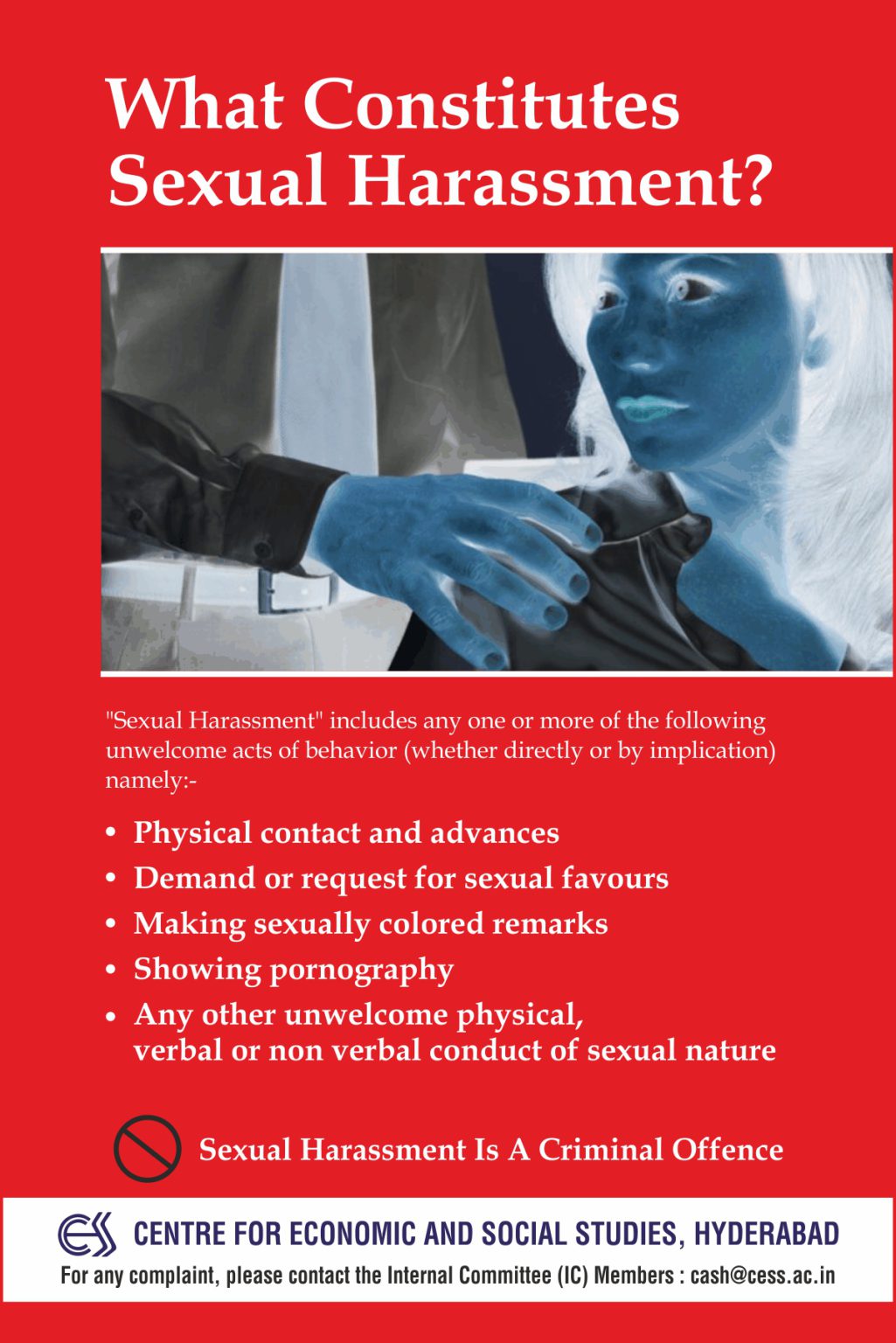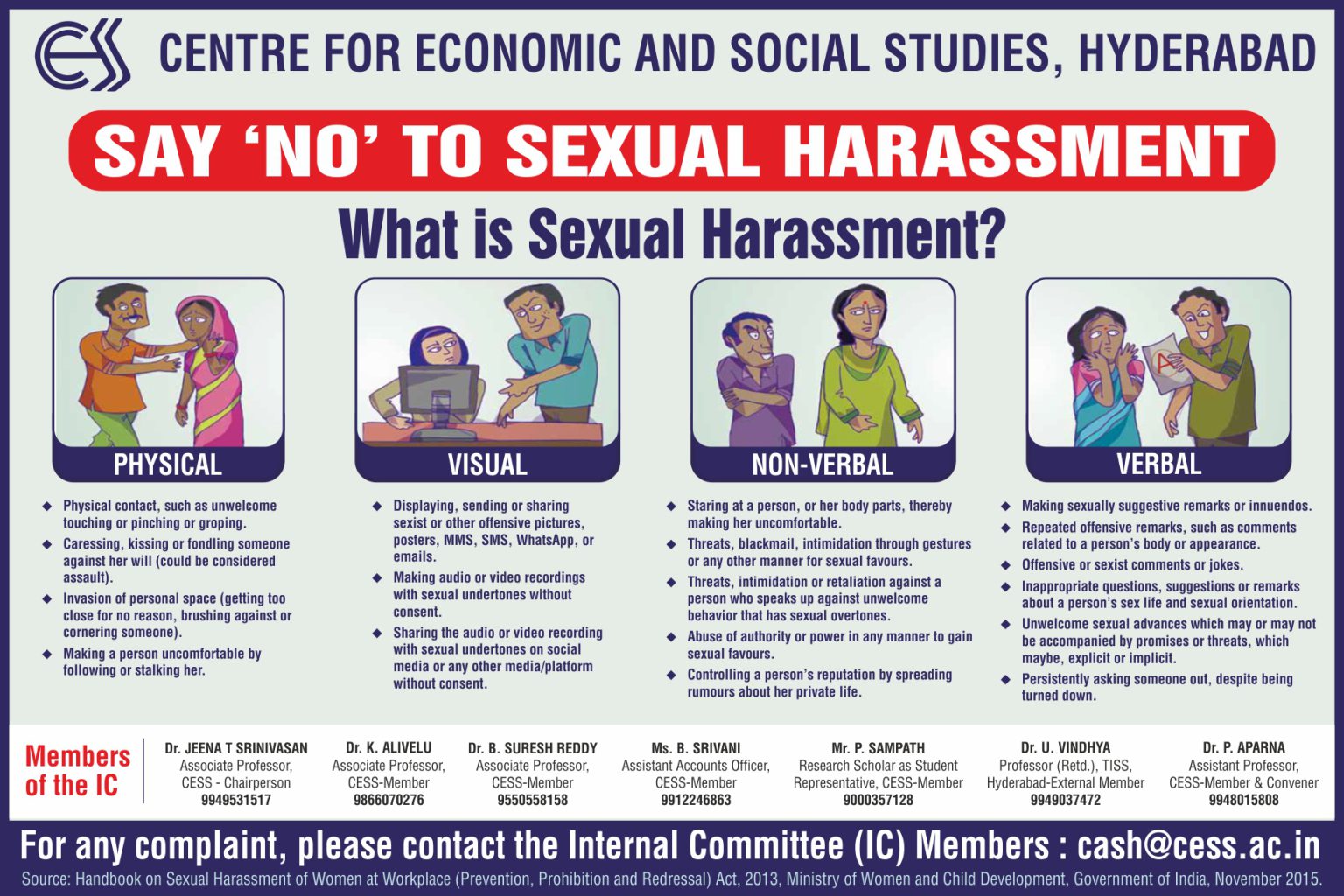Committee Against Sexual Harassment at Workplace (CASH)
Internal Committee (IC)
In Pursuance of order of Hon’ble Supreme Court of India dt:12.05.2023 in Civil Appeal No.2482 of 2014 that issued certain directions regarding the implementation of the POSH Act, 2013 and the request to ensure strict compliance, the Centre for Economic and Social Studies have Constituted the Internal Committee (IC).
The IC at CESS is composed of the following members:
Chairperson:
Dr. Jeena T Srinivasan,
Associate Professor, CESS
Ph:9949531517
Members:
K Alivelu
Associate Professor, CESS
Ph:9866070276
B Suresh Reddy
Associate Professor, CESS
Ph:9550558158
B Srivani
Assistant Accounts Officer, CESS
Ph:9912246863
P Sampath,
Research Scholar, CESS
Ph:9000357128
U Vindhya
Professor (Retd.), TISS, Hyderabad
Ph:9949037472
P Aparna,
Assistant Professor, CESS
Ph:9948015808
Background & Rationale:
As enshrined in the Preamble to the Constitution of India, “equality of status and opportunity” must be secured for all its citizens; equality of every person under the law is guaranteed by Article 14 of the Constitution. A safe workplace is, therefore, a woman’s legal right. Indeed, the Constitutional doctrine of equality and personal liberty is contained in Articles 14, 15 and 21 of the Indian Constitution. These articles ensure a person’s right to equal protection under the law, to live a life free from discrimination on any ground and to protection of life and personal liberty.
Sexual harassment constitutes a gross violation of women’s right to equality and dignity. Not only is it an infringement of the fundamental rights of a woman, under Article 19(1) (g) of the Constitution of India, “to practice any profession or to carry out any occupation, trade or business”; it erodes equality and puts the dignity and the physical and psychological well-being of workers at risk.
The Sexual Harassment of Women at Workplace (Prevention, Prohibition and Redressal) Act, 2013was enacted to ensure safe working spaces for women and to build enabling work environments that respect women’s right to equality of status and opportunity. An effective implementation of the Act will contribute to the realization of their right to gender equality, life and liberty, equality in working conditions everywhere. The sense of security at the workplace will improve women’s participation in work, resulting in their economic empowerment and inclusive growth.
Having raised the bar of responsibility and accountability in the Vishaka Guidelines, the Supreme Court placed an obligation on workplaces, institutions, and those in positions of responsibility, to uphold working women’s fundamental right to equality and dignity at the workplace. Three key obligations were imposed on institutions to meet that standard, namely: Prohibition, Prevention and Redress.
Objectives of IC:
The objectives of the Internal Committee to Prevent Sexual Harassment of Women at the Workplace are as follows:
To foster a safe and respectful workplace environment for all members of our institute.
Ensure awareness and Orientation regarding what constitutes sexual harassment, its impact, and the procedures for reporting incidents and on the penal consequences of sexual harassment.
To ensure the implementation of the policy in letter and spirit through proper reporting of the complaints and their follow-up procedures.
To uphold the commitment of the Institute to provide an environment free of gender-based discrimination and create awareness about issues of gender and sexuality and working towards and creating an enabling environment of gender justice where all can work together with a sense of personal security and dignity.
To create a secure physical and social environment to deter any act of sexual harassment.
To evolve a permanent mechanism for the prevention and redressal of sexual harassment cases and other acts of gender-based violence at the Institute.
WHAT IS SEXUAL HARASSMENT AT THE WORKPLACE?
Sexual Harassment” includes any one or more of the following unwelcome acts or behaviour.
(whether directly or by implication), namely:
Physical contact or advances.
A demand or request for sexual favours.
Making sexually coloured remarks.
Showing pornography.
Any other unwelcome physical, visual, verbal, or non-verbal conduct of a sexual nature
It is important to remember that workplace sexual harassment is sexual and unwelcome, and the experience is subjective. The impact and not the intent matters, and it almost always occurs in a matrix of power.
WHAT IS A WORKPLACE?
A workplace is defined as “any place visited by the employee arising out of or during employment, including transportation provided by the employer for undertaking such a journey.” As per this definition, a workplace covers the organised and un-organized sectors.
As per the Act, the workplace includes:
– Government organizations, including Government companies, corporations, and cooperative societies
– Private sector organizations, venture, society, trust, NGO or service providers etc. providing services which are commercial, vocational, educational, sports, professional, entertainment, industrial, health-related or financial activities, including production, supply, sale, distribution or service.
– Hospitals/Nursing Homes.
– Sports Institutes/Facilities.
– Places visited by the employee (including while on travel), including transportation provided by the employer,
– A dwelling place or house.
FORMS OF WORKPLACE SEXUAL HARASSMENT
Generally, workplace sexual harassment refers to two common forms of inappropriate behaviour:
Quid Pro Quo (literally ‘this for that’)
Implied or explicit promise of preferential/detrimental treatment in employment
Implied or express threat about her present or future employment status
Hostile Work Environment
Creating a hostile, intimidating, or an offensive work environment
Humiliating treatment likely to affect her health or safety
Jurisdiction:
The policy and the rules & regulations would apply to all students, faculty, and nonteaching staff on active roles of the workplace. The policy and the rules & regulations would also apply to service providers and outsiders who may be within the territory of the workplace at the time of commission of the act coming under the purview of the policy.
Who can approach IC for help?
Any female employee (faculty, student, or staff) of the workplace/institution
IF YOU THINK YOU ARE HARASSED OR BEING HARASSED, WHAT SHOULD YOU DO?
Send an email to the chairperson at
OR
If you are unable to make a complaint on any reason, the complaint may be filed by any person who has knowledge of the incident, with your written consent.
Your complaint will be kept CONFIDENTIAL.
To learn more about IC procedures, click here.
You may also refer to http://www.shebox.nic.in
Inquiry process:
The investigation must conclude within ninety days from the complaint’s submission. Once the Inquiry is finalized, the IC must furnish its findings to the employer/head of the institution within ten days of completing the investigation. This report will also be shared with the involved parties. In cases where the allegations against the respondent are substantiated, the IC will suggest punitive measures to the employer/head of the institution. The employer/head of the institution is mandated to act on these recommendations within sixty days of receipt.
What are the possible actions that can be taken against the respondent?
- Warning
- Written apology
- Bond of good behaviour
- Adverse remark in the Confidential Report
- Stopping of increments/promotion
- Suspension
- Dismissal
- Any other relevant actions


